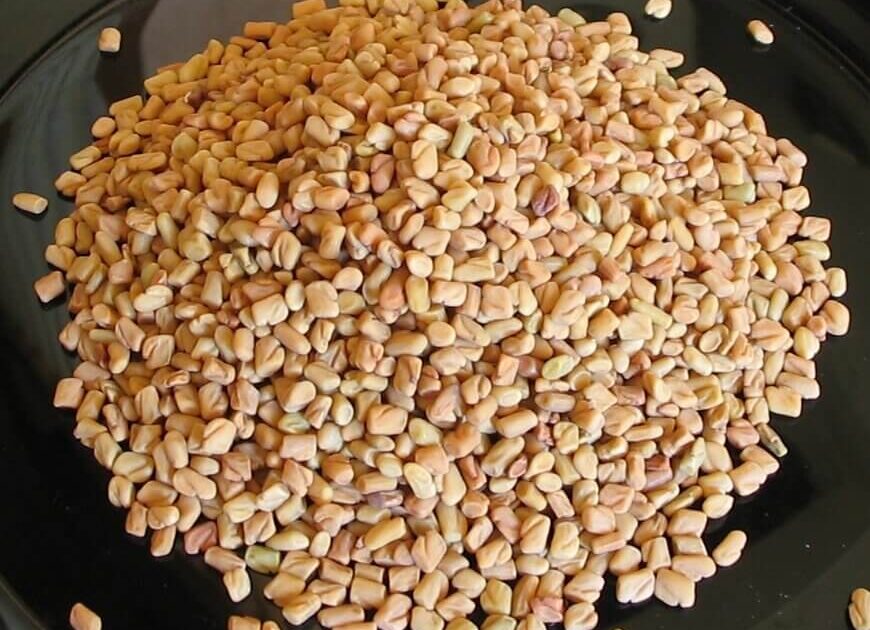Introduction
Fenugreek is believed to have been brought into cultivation during the Ottoman Empire in the Near East parts of the Western Asian region. Evidently, fenugreek has been grown as a staple food since the 1st century AD. It is one of the most ancient plants to be used for its culinary & medicinal value until now.
At present, India is a major producer, with its state Rajasthan attributing for over 80% of India’s output.
Since the majority of fenugreek health benefits lie in its seeds which have a very significant positive effect on our overall health but are very potent in nature, it is being used with caution in medicines for the production of herbal medicines even though its consumption for culinary purposes is considered fairly safe.
The list of fenugreek pharmacological health benefits can go beyond this article.
Fenugreek Health Benefits
- Fenugreek green leaves are one of the most ancient medicinal herbs containing beta-carotene (a precursor of vitamin A) & ascorbic acid, which prevents low levels of vitamin C in our body.
- It is rich in oleic acid which is a type of fatty acid. Oils with oleic acid are used to replace saturated fats in the diet. It improves heart conditions by lowering cholesterol and reducing inflammation
- It is rich in linoleic acid which decreases the risk of heart disease by helping to maintain normal heart rhythm and heart pumping. It also reduces the formation of blood clots.
- It is a great source of choline, which is a nutrient that supports cellular growth and metabolism. In 1998, the Institute of Medicine officially labeled choline as an ‘essential nutrient’.
- It contains nicotinic acid, which is used as a medicine to improve levels of blood fats (lipids) such as cholesterol and triglycerides. It works by reducing the amount of ‘bad’ cholesterol and triglycerides made by the liver.
- Being rich in niacin, also known as vitamin B3, is an important nutrient. Apart from lowering cholesterol, it stops the progression of arthritis and boosts brain function.
- It inhibits bile salt absorption in the colon and hence helps in lowering the low-density lipoprotein-cholesterol (LDL) in blood. Flavonoids from the seeds are known to maintain healthy cholesterol levels.
- The seeds extracted from its plant have polyphenolic compounds that bind the toxins of food and indirectly protect the intestinal membrane from the onset of cancer.
- The Fenugreek fiber is capable of moderating the human glucose metabolism. It also helps to lower blood glucose absorption and control sugar levels and thus facilitates the insulin action
- The anti-oxidants extracted from its seeds promote the detoxification of floating free radicals in our body by neutralizing them.
- Fenugreek seeds’ extracts reduce skin irritation and pain. Its powder paste produces skin healing, moisturizing, smoothening, and whitening.
- It promotes your gut health by speeding up digestion and lowering flatulence. Fenugreek seeds exhibit laxative properties & stimulate appetite.
- It has shown very promising results in anemic patients. Basically, it prevents red blood cell oxidation. Its seeds help in the restoration of iron in our blood.
- Its rich profile of antioxidants improves and reduces cell death and aging. It also helps to strengthen the immune system and immune stimulatory effects.
- It Inhibits the accumulation of oxidized DNA to prevent kidney injuries, especially in diabetic patients.
The medical fraternity has proved fenugreek seeds to be a supportive treatment or can be used in conjunction with other medicines in respiratory disorders, bacterial infection, epilepsy, gout, chronic cough, paralysis, dropsy, piles, heavy metal toxicity, liver disorders, and arthritis.
FAQs
Do fenugreek seeds make you gain weight?
- According to NCBI, due to the profile of proteins, galactomannan, and polyphenols found in fenugreek seeds, it inhibits fat accumulation. In addition to that, ingesting fenugreek seeks to improve glucose lipid metabolism, enhance insulin sensitivity & increase antioxidant defense, which can be potential factors responsible for weight gain. If anything, its regular use in your diet is linked to effective & rapid weight loss.
Does fenugreek make your boobs bigger?
- In lactating mothers, this herb is medically proven to increase the supply of breast milk. Apart from that, herbs like moringa, galega & shatavari are also associated with increased milk production in the breasts. These herbs are ideally taken in supplemental form but before buying them, kindly ensure to read the supplement label about its safety for lactating mothers.
How to make fenugreek sprouts.
Click here for a video on how to make fenugreek sprouts easily & quickly.
Citation
https://www.ncbi.nlm.nih.gov/pmc/articles/PMC4020548/
https://www.ncbi.nlm.nih.gov/pmc/articles/PMC4894452/
https://en.wikipedia.org/wiki/Fenugreek





I am currently writing a paper that is very related to your content. I read your article and I have some questions. I would like to ask you. Can you answer me? I’ll keep an eye out for your reply. 20bet
Your point of view caught my eye and was very interesting. Thanks. I have a question for you. https://www.binance.com/cs/register?ref=GJY4VW8W
Can you be more specific about the content of your article? After reading it, I still have some doubts. Hope you can help me. https://accounts.binance.com/ph/register-person?ref=V2H9AFPY
Can you be more specific about the content of your article? After reading it, I still have some doubts. Hope you can help me.
Thank you for your sharing. I am worried that I lack creative ideas. It is your article that makes me full of hope. Thank you. But, I have a question, can you help me?
Wow, fantastic weblog structure! How lengthy have you been running a blog
for? you make running a blog look easy. The total
look of your site is excellent, let alone the content!
You can see similar here e-commerce